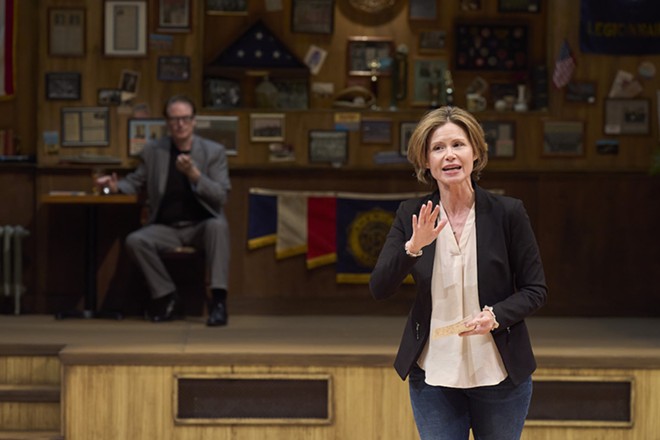Photo by Roger Mastroianni.” class=”uk-display-block uk-position-relative uk-visible-toggle”>

Photo by Roger Mastroianni.
Donald Carrier and Maggie Lacey in the CPH Production of WHAT THE CONSTITUTION MEANS TO ME
Sometimes, a cough is just a cough. At other times, though, it can signal a deeper meaning, it can indicate that there’s something wrong—not with a particular person or body—but with the body politic of our country.
This is only one of the many revelations awaiting in Heidi Schreck’s funny and furious play What the Constitution Means to Me, now at the Cleveland Play House. In 90 minutes of engrossing theater, director Linsay Firman guides us through Schreck’s family history as well as the glories of the U.S. Constitution. It also delves into the many dark holes which that revered document has left in its path.
Now, about the coughs. At one point in this jam-packed production, a tape is played of Supreme Court Justices discussing birth control. They interrupt themselves repeatedly with tiny coughs as they focus, awkwardly and obliquely, on details. Meanwhile, the humanity of the situation slides from their grasp. (Or, perhaps it was intentional.)
Aside from references to specific cases heard by the Supremes, the play is largely autobiographical. As Heidi, Maggie Lacey charm the audience as she confesses that she was raised to smile more and be “pathologically polite.” She occasionally stops to deconstruct the stage ambiance surrounding her, helping the audience to see past any theatrical illusions.
Heidi takes us back to when she was fifteen years old and competing for college money in rhetoric contests sponsored by the local American Legion Hall. Those competitions pitted high schoolers against each other as they were assigned to give a prepared speech about the question posed in the play’s title, along with speaking extemporaneously about a particular Constitutional amendment pulled at random from a jar.
But this is no droning recitation of dry factoids, since the script executes many fast turns and pirouettes as we learn about Heidi’s family history. These include her great-great grandmother Theresa, a mail-order bride purchased for $75 who died of “melancholia” at age 36. And her grandmother Bette who was beaten by Heidi’s stepfather who also raped Bette’s oldest daughter.
Yes, this play makes the political personal, reminding us that the white male dominance of the Supreme Court for all those decades had left us with an often superb but highly problematic Constitution. That has resulted in serious outcomes for real people.
Consider the pregnant women with difficult pregnancies who are now forced—due to a recent SC decision denying abortion services—to bleed sufficiently in hospital parking lots until they are sick enough to receive treatment. After such Constitutionally-protected neglect, some of them die.
Lacey’s outstanding performance is supported by the excellent Donald Carrier, who plays a Legionnaire conducting the contest. Later he reveals himself as an actor named Danny who, aside from providing “good male energy,” shares his own past and his conflicted history and thoughts.
Many storylines are touched on as the playwright and lead actor explore the penumbra, the shadowy human side of what the Constitution has wrought. On the lighter side, these mini-digressions involve her adolescent crush on Patrick Swayze and an equally passionate relationship with her sock puppet.
In a brilliant final coup-de-theatre, the concluding segment of the play involves a debate between Heidi and an actual, local 15-year-old girl. At this performance, Taya Offutt Decker (the role is played at alternate performances by Logan Dior Williams) took command of the stage as she traded barbs and bristling intelligence with her 40-something adversary.
Once they are done, an adult in the audience is called upon to be the judge. In this case, it was a fine gentleman named Gary from Cleveland Heights. And it is a reminder that we are all the judges of where the Constitution goes from here.
Our decisions, as reflected in the votes we cast between now and Nov. 5, will make serious impacts on the lives of real people. For better or worse.
What the Constitution Means to Me
Through November 3 at Cleveland Play House, Playhouse Square, Outcalt Theatre, 1407 Euclid Ave., clevelandplayhouse.com, 216-241-6000.
Subscribe to Cleveland Scene newsletters.
Follow us: Apple News | Google News | NewsBreak | Reddit | Instagram | Facebook | Twitter | Or sign up for our RSS Feed
